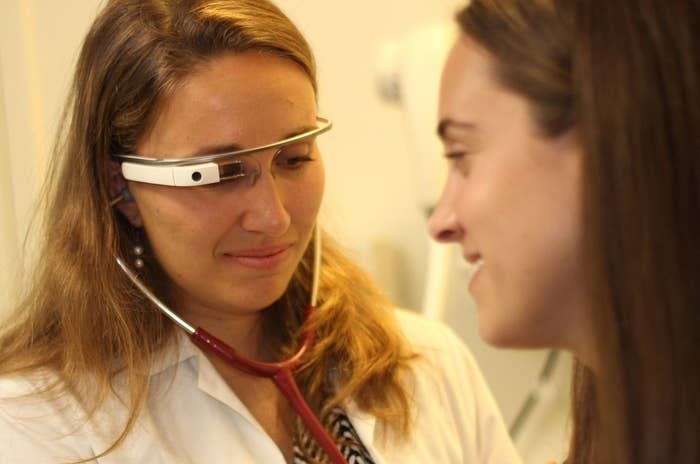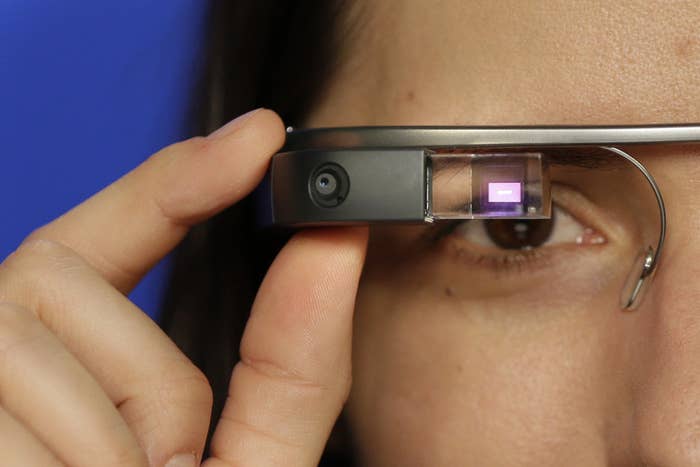
When Dr. Darren Phelan started wearing Google Glass more than a year ago, he did it with some trepidation. Though the internal medicine physician thought the novel device might help him at work, he was unsure how patients would react.
Now, Phelan dons the smartglasses daily in his concierge medicine practice in Menlo Park, California. A Glass app transcribes his conversations with patients and updates their records, and he no longer needs to spend up to 90 minutes a day manually typing up notes. Virtually no patients have objected, he said.
"It's a big waste of time for somebody who's making clinical decisions to enter data into a computer," Phelan told BuzzFeed News. "I'm going to generate a better record because I'm talking to a patient and answering great questions — I don't have my nose stuck in an [electronic health record]."
Glass was one of the most talked about trends in wearable computing in 2014, and Google pushed it hard in the hopes of gaining mainstream traction. It instead became a symbol of tech elitism and conspicuous consumption, its users derided and even attacked. Earlier this year, Google stopped selling the first version of Glass and moved the project out of its Google(x) lab into a stand-alone unit.
But while Glass failed to set the consumer space on fire, some clinicians and other medical professionals have embraced it as a hands-free means of sharing and accessing information quickly. As cases like Phelan's demonstrate, Glass still has promise in enterprise markets like health care. That lends credence to the company's claims that Glass remains viable, despite its unpropitious beginnings. As Google Executive Chairman Eric Schmidt told the Wall Street Journal last week, Glass is a "big and very fundamental platform for Google."

That’s not to say that Glass doesn’t face challenges.
Chief among them: concerns about the privacy of health information, and competition from rival wearable device manufacturers such as Sony and Vuzix.
One startup, in fact, has already given up on Glass altogether. In a pilot program, Remedy used the device to help physician assistants and surgeons communicate about patients' statuses. But it recently dropped Glass and modified the app for smartphones and tablets, this time to give primary-care doctors instant access to specialists. Co-founder Noor Siddiqui blamed Glass' short battery life (two hours) and shaky Wi-Fi: "I just personally don't think the hardware lived up to the hype."
But specific problems with Glass aside, Pelu Tran, chief product officer of Augmedix — the developer of the transcription app used by Phelan — said that we've only begun to see the many ways in which smartglasses can be used.
"One of the things we noticed over the past year or two is a lot of people tried to deploy smartglasses just because they were cool, and didn't have strong business cases or strong use cases that define enterprise success," Tran told BuzzFeed News. "The companies you're seeing in the smartglass category, compared to a year ago, are much more sustainable."
Augmedix only uses Glass now, but its founders suggested in an interview that it may expand to support other smartglasses as well.
Another Glass app startup, Pristine, has already done that, adding support for wearables from Vuzix, Epson, and ODG. It's also broadened the focus of its app, EyeSight. Originally intended as a wireless communication tool in wound care, the app is now also used to remotely troubleshoot malfunctioning life-science and factory equipment.
"We found that the problem we're solving is not a health care–specific problem," Pristine CEO Kyle Samani told BuzzFeed News. "It's a 'I have something that is not working in front of me, please help me fix it' kind of a problem."
And VIZR Tech, a startup that launched late last fall and works on Glass, tablets, and smartphones, gives surgeons a visualized to-do list in the operating room. In an interview with BuzzFeed News, VIZR's Managing Director Rick Buchler compared Glass to another novel technology that was largely derided, but has managed to find a use.
"Everyone thought everyone would be riding Segways all over the place, but that doesn't work out. But for certain things, it does really well," like Segway city tours, said Buchler. "Same thing with Google Glass: If you're wearing it around or using it to cook with, it's just not the right application."
